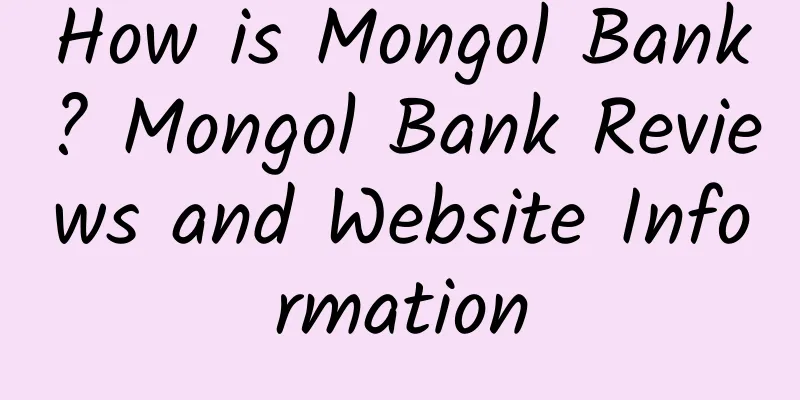How is Mongol Bank? Mongol Bank Reviews and Website Information

|
What is the Bank of Mongolia website? The Bank of Mongolia (BoM) is the central bank of Mongolia. It was established in 1991 and is headquartered in Ulaanbaatar. It is administratively supervised by the State Great Khural. The main functions of the Bank of Mongolia include issuing currency and managing its circulation, formulating and implementing monetary policy, and supervising the business operations of financial institutions. Website: www.mongolbank.mn Bank of Mongolia: The central bank of MongoliaThe Bank of Mongolia (BoM) is the central bank of Mongolia. It was established in 1991 and is headquartered in Ulaanbaatar, the capital of Mongolia. As the country's financial hub, the Bank of Mongolia plays a vital role in Mongolia's economic system. It is not only responsible for issuing and managing the national currency, but also for formulating and implementing monetary policy, supervising the business operations of financial institutions, and ensuring the stability and security of the financial system. Background of the establishment of the Bank of MongoliaThe establishment of the Bank of Mongolia can be traced back to 1991, when Mongolia was in a critical period of economic transformation. With the disintegration of the Soviet Union, Mongolia was transitioning from a planned economy to a market economy, and an independent central bank was needed to guide this transition process. The establishment of the Bank of Mongolia marked the modernization and internationalization of Mongolia's financial system, laying a solid foundation for the country's economic development. Main functions of the Bank of MongoliaAs the central bank, the Bank of Mongolia undertakes a number of important functions, mainly including the following aspects: 1. Currency issuance and managementThe Bank of Mongolia is responsible for issuing the legal tender of Mongolia, the Tugrik (MNT), and managing its circulation. By controlling the money supply, the Bank of Mongolia can influence the country's inflation rate and economic growth rate. The stable issuance and circulation of currency is the basis for the healthy operation of the economy. The Bank of Mongolia ensures the rationality and stability of the money supply through precise monetary policy tools. 2. Formulate and implement monetary policyThe Bank of Mongolia is responsible for formulating and implementing the country's monetary policy. By adjusting interest rates and open market operations, the Bank of Mongolia can influence the flow of funds in the market, thereby achieving the goals of controlling inflation, stabilizing prices, and promoting economic growth. Monetary policy is an important means for the Bank of Mongolia to regulate the economy. Through flexible monetary policy tools, the Bank of Mongolia can respond to changes in the domestic and international economic environment and ensure the smooth operation of the economy. 3. Supervision of financial institutionsThe Bank of Mongolia is responsible for supervising financial institutions in Mongolia, including commercial banks, insurance companies, securities companies, etc. By formulating and implementing relevant laws and regulations, the Bank of Mongolia ensures that the business operations of these institutions are compliant and sound, protects the rights and interests of consumers, and maintains the stability of the financial market. Financial supervision is one of the important responsibilities of the Bank of Mongolia. Through strict supervision of financial institutions, the Bank of Mongolia can effectively prevent financial risks and ensure the security of the financial system. 4. Foreign exchange managementThe Bank of Mongolia is also responsible for managing the country's foreign exchange reserves, formulating and implementing foreign exchange policies, ensuring the country's foreign exchange receipts and payments balance, and maintaining exchange rate stability. Foreign exchange management is one of the important functions of the Bank of Mongolia. Through effective foreign exchange management, the Bank of Mongolia can safeguard the country's international payment capabilities and promote the development of international trade and investment. 5. Financial stability and crisis managementThe Bank of Mongolia is responsible for maintaining the stability of the financial system and preventing and responding to financial risks. During financial crises or economic turmoil, the Bank of Mongolia will take a series of measures, such as providing liquidity support and adjusting monetary policy, to stabilize the financial market and the economy. Financial stability is one of the core goals of the Bank of Mongolia. Through effective crisis management, the Bank of Mongolia can ensure the smooth operation of the national economy. Organizational Structure of the Bank of MongoliaThe organizational structure of the Bank of Mongolia consists of the following main departments: 1. President's OfficeThe Office of the President is the highest decision-making body of the Bank of Mongolia and is responsible for formulating and implementing the overall strategy and policies of the bank. The President is appointed by the President of Mongolia for a term of five years and can be re-elected once. The Office of the President is also responsible for coordinating the work of various departments to ensure the efficient operation of the bank. 2. Monetary Policy CommitteeThe Monetary Policy Committee is responsible for formulating and implementing monetary policy, including interest rate policy, open market operations, etc. The committee is composed of the Governor, Deputy Governors and other senior officials, and meets regularly to discuss and decide on the direction and measures of monetary policy. 3. Financial Supervision DepartmentThe Financial Supervision Department is responsible for supervising financial institutions in Mongolia and ensuring that their business operations are compliant and sound. The department is also responsible for formulating and implementing relevant regulations to protect the rights and interests of consumers and maintain the stability of the financial market. 4. Foreign Exchange Administration DepartmentThe Foreign Exchange Administration Department is responsible for managing the country's foreign exchange reserves, formulating and implementing foreign exchange policies, ensuring the country's foreign exchange receipts and payments are balanced, and maintaining exchange rate stability. The department is also responsible for monitoring changes in the international financial market and adjusting foreign exchange policies in a timely manner. 5. Research and Statistics DepartmentThe Research and Statistics Department is responsible for collecting and analyzing economic data to provide a scientific basis for the formulation and implementation of monetary policy. The department is also responsible for publishing economic research reports to provide decision-making references for the government and enterprises. Historical Development of the Bank of MongoliaSince its establishment in 1991, the Bank of Mongolia has undergone several important reforms and developments, gradually establishing a modern central banking system. The following are several key stages in the historical development of the Bank of Mongolia: 1. Early years (1991-1995)In the early days of the establishment of the Bank of Mongolia, its main tasks were to establish an independent central bank system, formulate and implement monetary policy, and stabilize the economy. During this period, the Bank of Mongolia gradually established a currency issuance and management system and began to implement monetary policy under the market economy system. 2. Financial reform and opening up (1996-2000)With the gradual opening up of Mongolia's economy, the Bank of Mongolia began to implement a series of financial reforms, including interest rate marketization and foreign exchange management system reform. These reforms have created a good financial environment for Mongolia's economic development and promoted rapid economic growth. 3. Financial crisis and response (2001-2005)In 2001, Mongolia suffered a serious financial crisis. The Bank of Mongolia took a series of measures, including providing liquidity support and adjusting monetary policy, to successfully stabilize the financial market and economy. The experience of this stage provides the Bank of Mongolia with valuable experience in dealing with future financial crises. 4. Economic recovery and growth (2006-2010)After the financial crisis, Mongolia's economy gradually recovered, and the Bank of Mongolia continued to implement a prudent monetary policy to support rapid economic growth. During this period, the Bank of Mongolia also strengthened supervision of financial institutions to ensure the stability of the financial system. 5. Modernization and internationalization (2011 to present)In recent years, the Bank of Mongolia has actively promoted the process of modernization and internationalization, strengthened cooperation with international financial institutions, and enhanced its international influence. The Bank of Mongolia has also actively participated in international financial affairs and promoted the international development of Mongolia's economy. The future prospects of Mongolian banksLooking ahead, Bank of Mongolia will continue to be committed to maintaining financial stability and promoting economic growth. With the continuous development of Mongolia's economy and the acceleration of its internationalization process, Bank of Mongolia will face more challenges and opportunities. The following are several major directions for the future development of Bank of Mongolia: 1. Strengthen financial supervisionWith the continuous development and innovation of the financial market, the Bank of Mongolia needs to further strengthen financial supervision, prevent financial risks, and ensure the stability of the financial system. The Bank of Mongolia will continue to improve the financial supervision system and enhance the transparency and effectiveness of supervision. 2. Promote monetary policy reformThe Bank of Mongolia will continue to promote monetary policy reform and improve the flexibility and effectiveness of monetary policy to cope with changes in the domestic and international economic environment. The Bank of Mongolia will strengthen the analysis and research of economic data and improve the scientific nature and forward-looking nature of monetary policy. 3. Strengthen international cooperationThe Bank of Mongolia will strengthen cooperation with international financial institutions, enhance its international influence, and promote the international development of Mongolia's economy. The Bank of Mongolia will actively participate in international financial affairs and promote the reform and improvement of the international financial system. 4. Improve the level of financial servicesThe Bank of Mongolia will continue to improve its financial services to meet the people's growing financial needs. The Bank of Mongolia will strengthen its guidance and support for financial institutions to promote the innovation and development of financial services. Mongolian Bank websiteThe official website of the Bank of Mongolia is www.mongolbank.mn . Through this website, the public can obtain the latest monetary policy, financial data, research reports and other information. The Bank of Mongolia also provides online services through the website to facilitate the public to handle various financial businesses. In conclusion, as the central bank of Mongolia, the Bank of Mongolia plays an irreplaceable role in the country's economic development. Through effective monetary policy, financial supervision and foreign exchange management, the Bank of Mongolia provides a solid guarantee for Mongolia's economic stability and growth. In the future, the Bank of Mongolia will continue to be committed to maintaining financial stability, promoting economic growth, and promoting the modernization and internationalization of Mongolia's economy. |
>>: What is AB InBev like? AB InBev reviews and website information
Recommend
The efficacy and nutritional value of large prawns
Introduction to King Prawn Prawns are saltwater s...
What to do if you get stung by a scorpion What to do if you get stung by a scorpion
Scorpions are poisonous animals and are aggressiv...
What is FactSet Research Systems like? FactSet Research Systems reviews and website information
What is FactSet Research Systems? FactSet Research...
The efficacy and function of seedless watermelon
Seedless watermelon is a kind of fruit that peopl...
The efficacy and function of cannon cat meat
Cannon cat meat is a dried product obtained by pr...
The difference between jackfruit and durian
Jackfruit and durian are both tropical fruits wit...
The efficacy and function of Albizzia julibrissin
Albizia Julibrissin is a leguminous plant, a deci...
How to check the authenticity of Dior lipstick
Dior is a big brand in the world of cosmetics, es...
What is Blizzard Entertainment like? Blizzard Entertainment reviews and website information
What is the website of Blizzard Entertainment? Bli...
How is the Global Environment Fund? Global Environment Fund reviews and website information
What is the Global Environment Fund? The Global En...
The efficacy and function of Bergenia
Bergenia is a plant of the Saxifragaceae family. ...
Rush University Review and Website Information
What is Rush University? Rush University is locate...
Garlic's efficacy in lowering blood sugar and fighting cancer
Although garlic is mostly used as a seasoning in ...
How to make delicious air-dried fish
In the absence of a refrigerator, it is common to...
Effects, functions and medicinal value of sour plum
Everyone knows that black plum is a delicious fru...









